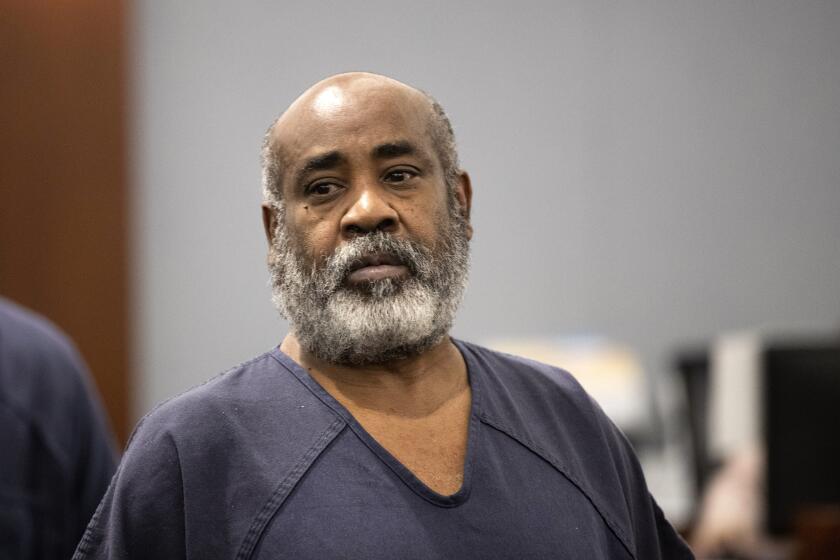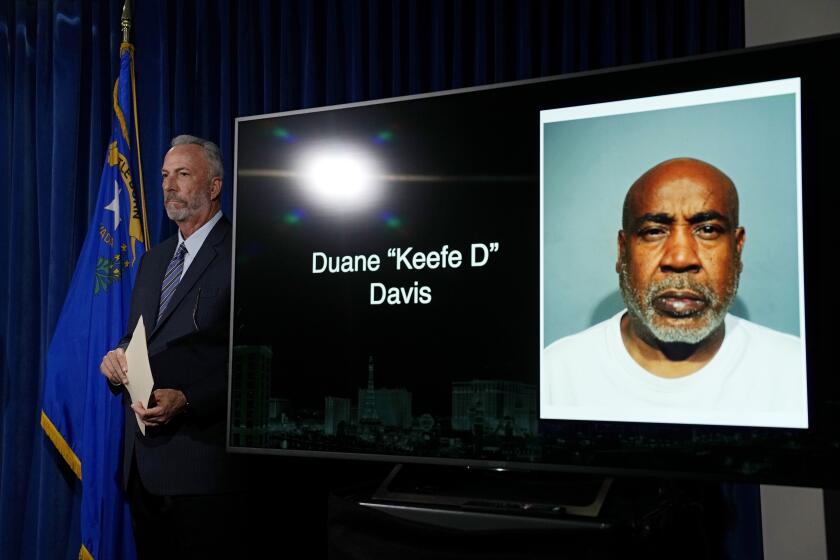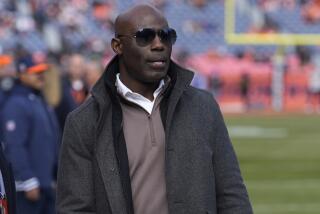Tupac’s accused killer Duane ‘Keffe D’ Davis granted $750,000 bail

- Share via
A former Compton gang leader charged with orchestrating the 1996 killing of Tupac Shakur can be released on $750,000 bail and placed under house arrest with electronic monitoring pending a June trial, a Clark County, Nev., judge decided Tuesday.
Court-appointed lawyers for Duane “Keffe D” Davis had sought his release on his own recognizance or a reasonable bail, citing the 60-year-old former gang leader was in poor health after battling cancer, which is currently in remission.
After the hearing, a member of Davis’ legal team told reporters: “We believe he can” post bail.
Davis, an admitted “shot caller” for the Compton Southside Crips, was arrested in late September in connection with Shakur’s slaying. The arrest came two months after Las Vegas police served a search warrant at his home in Henderson, Nev. He has pleaded not guilty to a murder charge and has remained jailed without bail since.
A bail hearing for the man accused of orchestrating the 1996 killing of Tupac Shakur was postponed Tuesday amid prosecutors’ allegations that he poses a risk to potential witnesses in the case.
Prosecutors had sought to keep Davis behind bars, arguing he was a threat to witnesses in the case.
In an October recording of a phone call by Davis from the Clark County Detention Center in Las Vegas, prosecutors say Davis’ son told the defendant about a “green light” authorization.
“In (Davis’) world, a ‘green light’ is an authorization to kill,” prosecutors Marc DiGiacomo and Binu Palal told Clark County District Court Judge Carli Kierny in the court document.
The court filing made no reference to Davis instructing anyone to harm someone or anyone being physically harmed, but prosecutors say at least one witness was provided assistance from federal authorities “so he could change his residence.”
Davis’ legal team told the judge that their client never threatened anyone. “Duane’s son was saying he heard there was a greenlight on Duane’s family,” Davis’ attorneys wrote in seeking bail.
Duane ‘Keffe D’ Davis remains in custody on an indictment of murder, accused of organizing the killing of Tupac Shakur. But his lawyer says authorities have nobody to verify the tales of his involvement.
Prosecutors say Davis, who was indicted by a grand jury on a charge of murder with a firearm, didn’t pull the trigger but provided the gun and encouraged the killing as revenge for a beating that his nephew Orlando Anderson had received at the hands of Shakur, Death Row Records head Marion “Suge” Knight and others affiliated with the Mob Piru Bloods at the MGM Grand Hotel.
Knight was driving Shakur in a BMW near the Las Vegas Strip when a white Cadillac pulled alongside them and a gunman opened fire, according to police and court records. Knight and Davis are the only living witnesses to the killing.
Authorities have said some of the most compelling evidence against Davis comes from the suspect himself.
Davis identified Anderson as the shooter in 2008 when he finally talked to authorities with the protection of a proffer from the Los Angeles Police Department and the FBI, meaning his statements could not be used against him. In that interview, then-LAPD Det. Greg Kading asked whether Anderson, a.k.a. Baby Lane, had pulled the trigger.
Shakur “leaned over, and Orlando rolled down the window and popped him,” Davis replied. “If they would have drove on my side, I would have popped them. But they was on the other side.”
When Kading and the LAPD’s Daryl Dupree interviewed Davis in December 2008, they were seeking to solve the 1997 slaying of rapper Christopher Wallace, or “The Notorious B.I.G.,” also known as Biggie Smalls. The proffer information could not be used to charge Davis, but his statements since were part of the evidence presented to the grand jury this year.
More to Read
Sign up for Essential California
The most important California stories and recommendations in your inbox every morning.
You may occasionally receive promotional content from the Los Angeles Times.
















